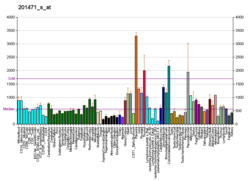Sequestosome-1 is a protein that in humans is encoded by the SQSTM1 gene. [5] [6] [7] Also known as the ubiquitin-binding protein p62, [8] it is an autophagosome cargo protein that targets other proteins that bind to it for selective autophagy. By interacting with GATA4 and targeting it for degradation, it can inhibit GATA-4 associated senescence and senescence-associated secretory phenotype. [9]
Contents
Mutations in SQSTM1 are a common cause of Paget's disease of bone. [10]







